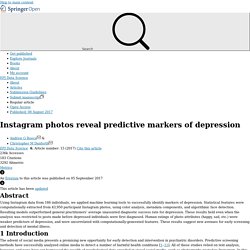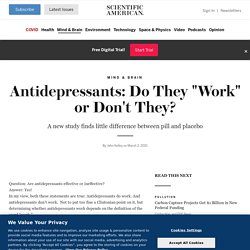

Instagram photos reveal predictive markers of depression. The present study employed computational machine learning techniques to screen for depression using photographs posted to Instagram.

Our results supported Hypothesis 1, that markers of depression are observable in Instagram user behavior, and Hypothesis 2, that these depressive signals are detectable in posts made even before the date of first diagnosis. Human ratings proved capable of distinguishing between Instagram posts made by depressed and healthy individuals (Hypothesis 3a), but showed little or no correlation with most computational features (Hypothesis 3b). Our findings establish that visual social media data are amenable to analysis of affect using scalable, computational methods. One avenue for future research might integrate textual analysis of Instagram posts’ comments, captions, and tags. Our model showed considerable improvement over the ability of unassisted general practitioners to correctly diagnose depression. History. The history of the treatment of depression is hard to put a date on.

In the early years of treatment there was little or no distinction between mental disorders as we know them today. Depression was not recognized as a unique problem and therefore did not receive unique treatment. Timeline : Research and treatment approaches to depression : Nature Reviews Neuroscience. The Science and History of Treating Depression. Few medicines, in the history of pharmaceuticals, have been greeted with as much exultation as a green-and-white pill containing 20 milligrams of fluoxetine hydrochloride — the chemical we know as .

In her 1994 book “Prozac Nation,” Elizabeth Wurtzel wrote of a nearly transcendental experience on the drug. The Science and History of Treating Depression. Like Wurtzel, millions of Americans embraced antidepressants.

In 1988, a year after the Food and Drug Administration approved Prozac, 2,469,000 prescriptions for it were dispensed in America. By 2002, that number had risen to 33,320,000. By 2008, antidepressants were the third-most-common prescription drug taken in America. Fast forward to 2012 and the same antidepressants that inspired such enthusiasm have become the new villains of modern psychopharmacology — overhyped, overprescribed chemicals, symptomatic of a pill-happy culture searching for quick fixes for complex mental problems.
In “The Emperor’s New Drugs,” the psychologist Irving Kirsch asserted that antidepressants work no better than sugar pills and that the clinical effectiveness of the drugs is, largely, a myth. Historical Understandings of Depression - Depression: Major Depression & Unipolar Varieties. Rashmi Nemade, Ph.D., Natalie Staats Reiss, Ph.D., and Mark Dombeck, Ph.D.

Depression has always been a health problem for human beings. Historical documents written by healers, philosophers, and writers throughout the ages point to the long-standing existence of depression as a health problem, and the continuous and sometimes ingenious struggles people have made to find effective ways to treat this illness. Depression was initially called "melancholia". The earliest accounts of melancholia appeared in ancient Mesopotamian texts in the second millennium B.C.
At this time, all mental illnesses were attributed to demonic possession, and were attended to by priests. Ancient Greeks and Romans were divided in their thinking about the causes of melancholia. Hippocrates, a Greek physician, suggested that personality traits and mental illnesses were related to balanced or imbalanced body fluids called humours. Timeline : Research and treatment approaches to depression : Nature Reviews Neuroscience. Employee Fired Because Of Depression Wins Right To Jury Trial. February 22nd, 2010 | Ellen Simon Banker Terminated When “Regarded As Disabled” And Because Of Perceived Mental Impairment Has ADA Claim Disability claims involving mental impairments can be tough.

That’s why this recent case from a federal district court in the Eight Circuit is an important and helpful read. Here’s what happened in the case of Lizotte v. Dacotah Bank.* Facts Of The Case Alfred Lizotte was an assistant vice president of commercial lending at Dacotah Bank where he had been employed since 2003. On Thursday, November 30, 2006 Lizotte consumed somewhere between 10-12 drinks at a local bar. When his sister arrived at the cemetery, he told her that he “didn’t want to be here anymore.” Lizotte drove away, was stopped by the police, and taken into custody. On December 1, 2006 Lizotte called his immediate supervisor and told him that he was unable to come to work. On December 14, 2006 Lizette met with Compton and two officers of the bank. The Lawsuit ADA: What’s The Law? Translational Psychiatry - Blood transcriptomic biomarkers in adult primary care patients with major depressive disorder undergoing cognitive behavioral therapy. PPD_WhatPedsNeedtoKnow.pdf.
Warning: Antidepressants May Lead to Suicidal Tendencies. Antidepressants: Do They "Work" or Don't They? - Scientific American. Question: Are antidepressants effective or ineffective?

Answer: Yes! In my view, both these statements are true: Antidepressants do work. And antidepressants don’t work. Not to put too fine a Clintonian point on it, but determining whether antidepressants work depends on the definition of the word “work.” A controversial article just published in the prestigious Journal of the American Medical Association concluded that antidepressants are no more effective than placebos for most depressed patients. There have been at least four other review articles published in the last eight years that have come to similar conclusions about the limited clinical efficacy of antidepressants, and one of the study authors, psychologist Irving Kirsch, has recently published a book on the topic, provocatively entitled The Emperor’s New Drugs: Exploding the Antidepressant Myth.
The essential facts about antidepressant efficacy are not in dispute. So what’s the bottom line?